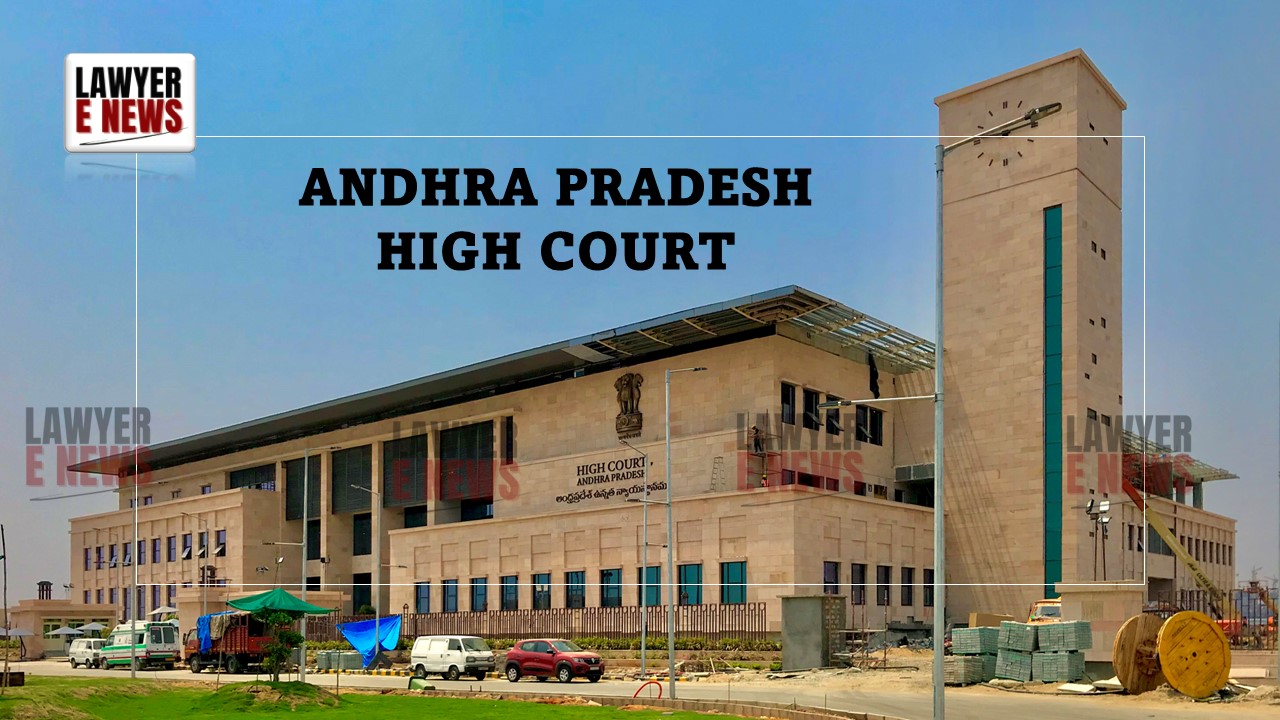-
by sayum
14 February 2026 2:22 PM



The Andhra Pradesh High Court addressing critical issues surrounding the arrest and judicial remand of the petitioner’s son under the provisions of the Andhra Pradesh BNSS Act and the Information Technology (IT) Act. The Court emphasized compliance with constitutional safeguards under Article 22(1) of the Constitution and clarified the distinction between "grounds of arrest" and "reasons for arrest."
“Failure to Serve Grounds of Arrest Invalidates Detention”: High Court Observes
At the heart of the case was the petitioner’s habeas corpus plea challenging the arrest and remand of his son, who was accused of posting defamatory and provocative material on social media targeting political leaders, including the Chief Minister. The petitioner argued that the arrest was illegal as the grounds of arrest were not served in writing, as mandated by Article 22(1) of the Constitution, and claimed that the Magistrate’s remand order was issued mechanically without proper scrutiny of the legal provisions.
The Court reiterated the constitutional requirement to serve the grounds of arrest to the detained person, noting that this procedural safeguard ensures that an accused can prepare a defense, oppose custodial remand, or apply for bail. It cited the Supreme Court's landmark decision in Prabhir Purkayastha vs. State (NCT of Delhi), which held that "mere reasons for arrest" do not suffice; specific "grounds of arrest" must be provided in writing.
Remand Report Can Satisfy Article 22(1) Requirements, Rules Court
While the Court held that the notice issued under Section 47 of the BNSS Act to the detenue did not adequately communicate the grounds of arrest, it determined that the remand report furnished to the accused at the time of judicial custody satisfied the constitutional mandate under Article 22(1). The remand report contained sufficient details of the allegations, enabling the accused to understand the case against him.
“The requirement of furnishing grounds of arrest is traceable to Article 22(1) of the Constitution and is applicable to all criminal proceedings. However, serving grounds of arrest via a remand report can fulfill the mandate, provided the report includes sufficient details about the allegations.”
This interpretation aligns with the Supreme Court’s observation in Prabhir Purkayastha that remand reports containing the grounds of arrest could suffice if served within 24 hours of the arrest.
Mechanical Application of Legal Provisions Vitiates Remand Orders The High Court criticized the Magistrate's remand order for failing to scrutinize the applicability of Sections 111 and 308(5) of the BNSS Act. These provisions, which involve allegations of organized crime and violent activities, require specific preconditions, including prior cognizance of at least two charge sheets against the accused in the preceding ten years.
The Court found that the remand order did not consider whether these preconditions were satisfied. Instead, the Magistrate accepted the submissions of the investigating officer without proper application of mind, thereby making the order vulnerable to judicial review.
It observed:
"The satisfaction recorded by the Magistrate, as to the applicability of Section 111, is clearly flawed and has been recorded without application of mind."
However, the Court refrained from quashing the remand order outright, leaving it to the detenue to pursue statutory remedies such as bail or quashing of proceedings.
The Court upheld the maintainability of the habeas corpus petition despite the Magistrate’s remand order. It ruled that such a writ is maintainable when remand orders are passed mechanically or without jurisdiction, as laid down by the Supreme Court in Gautam Navlakha vs. National Investigation Agency.
The respondents argued that the complainant (victim) had a right to be heard under the Supreme Court's decision in Jagjeet Singh vs. Ashish Mishra. However, the Court clarified that the complainant's presence was unnecessary in habeas corpus petitions challenging procedural compliance during arrest and remand.
The Court reiterated that "grounds of arrest" are personal to the accused and distinct from "reasons for arrest," which are generic in nature. Grounds of arrest must provide the accused with sufficient information about the allegations to oppose remand or seek bail effectively.
While arrest notices under Section 47 BNSS lacked specificity, the remand report provided to the accused contained sufficient information to satisfy the constitutional requirement of informing the grounds of arrest.
The High Court dismissed the writ petition, holding that the arrest and remand were procedurally valid, though the Magistrate’s order was passed mechanically. The detenue was granted liberty to pursue statutory remedies, including bail or quashing of the proceedings.
The judgment reinforces the constitutional safeguards surrounding arrests and underlines the importance of judicial scrutiny in remand proceedings.
Date of Decision: 18/12/2024
